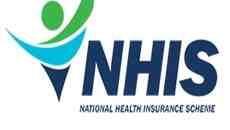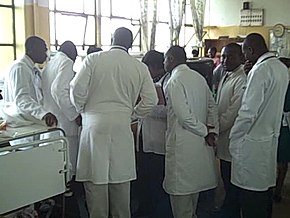Health in Ghana
|
|
|
|---|---|
| Health indicators | |
| Life expectancy | 66 |
| Infant mortality | 39 |
| Fertility | 2.12 |
| Sanitation | 14% (2010) |
| Smoker | 1% |
| Obesity female | 7% |
| Obesity male | 2% |
| Malnutrition | 1% |
| HIV | 0.7% |
| National Health Insurance Scheme | |
 |
|
| Agency overview | |
|---|---|
| Formed | 2003 |
| Jurisdiction |
|
| Parent agency | Parliament of Ghana |
| Website | Official Website |
Health in Ghana includes the healthcare systems on prevention, care and treatment of diseases and other maladies.
In the 16th century, traditionally, village healers and clerics were the primary care givers, offering herbal remedies. Though herbalists have traditionally offered the most ready treatment of illness, premodern traditional beliefs stressed the combination of spiritual and physical healing. Western medicine was introduced by Christian missionaries to the Gold Coast in the 19th century. This region was most involved in the development of a new health care system.
A pre-medical department was formed initially, and in 1878, the Towns, Police, and Public Health Ordinance was enforced under its direction, initiating the construction and demolishing of infrastructure, draining of the streets, and issuing of fines to those that failed to comply with the heads of the colony. In 1893, a Public Works Department was introduced to implement a working sanitation system for the colony.
In the 1880s, a Medical Department was formed, bringing about an introduction to a formal medical system, consisting of a Laboratory Branch for research, a Medical Branch of hospitals and clinics, and the Sanitary Branch for public health. After the war, the central government made a concentrated effort to expand western style medical facilities; and after World War II, both the World Health Organization and the United Nations Children's Fund had been active in providing money and support to provide additional western medical care in Ghana.
In Ghana, most health care is provided by the government and largely administered by the Ministry of Health and Ghana Health Services. The healthcare system has five levels of providers: health posts which are first level primary care for rural areas, health centers and clinics, district hospitals, regional hospitals and tertiary hospitals.
These programs are funded by the government of Ghana, financial credits, Internally Generated Fund (IGF), and Donors-pooled Health Fund. Hospitals and clinics run by Christian Health Association of Ghana also provide healthcare services. There are 200 hospitals in Ghana. Some for-profit clinics exist, but they provide less than 2% of health care services.
...
Wikipedia

